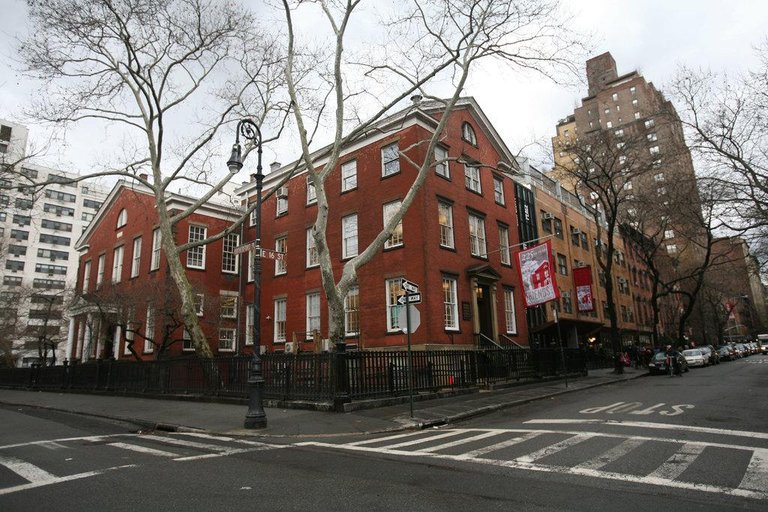
On Feb. 14, Ben Frisch, in his 34th year teaching at Friends Seminary, a private school in downtown Manhattan was seeking to demonstrate an obtuse angle in an 11th grade math class. Straightening his arm and pointing it outward, he mimicked the Nazi salute and said, “Heil Hitler.”
Mr. Frisch’s father was an Austrian Jew who suffered traumatic anti-Semitic attacks as a child in Poland before World War II and lost his grandparents in the Holocaust. Mr. Frisch, a devout Quaker, has been considered one of the most spiritually serious members of the faculty at the school, founded in 1786, by members of the Religious Society of Friends. No one believed he had suddenly become a Third Reich sympathizer, but at the same time not everyone found his professed effort at comedy particularly whimsical.
Not long after the incident, Mr. Frisch received a call from the administration telling him that there had been complaints about his analogy, that some students were offended and that he should not come to school the following morning. A period of limbo preceded a suspension, and on March 9, the day after the school’s gala and auction, he was fired.
Later that day, the school’s principal, Robert Lauder (Friends is the rare independent school that shuns the term headmaster), sent a letter to the community explaining the termination. “Our students know that words and signs of hate and fear have no place at Friends,’’ he wrote, adding that as news of Mr. Frisch’s gaffe had circulated, the administration started to receive calls and emails about “other equally inappropriate and troubling actions by Ben.”
These were not named, and because Mr. Frisch, who has had no disciplinary actions in his long tenure, is challenging his termination through an internal grievance process, neither he nor the school’s administrators will talk about what has happened.
Current and former teachers, students, alumni and many parents quickly voiced their support for him. Various petitions circulated. One that passed around the upper school, where there are 279 students, in advance of the firing, received 190 signatures. A few days after Mr. Frisch was let go, Abraham Levin, a senior, organized a student walkout in protest, and several teachers joined it. Many students expressed the idea that it was ridiculous to think of the incident as anti-Semitic, Mr. Levin told me. At one meeting, he said, a student worried that the school’s reaction could increase actual anti-Semitism because it had the effect of making Jews seem uptight and crazy
Mr. Frisch was known as an approachable and passionate teacher. Before the start of each class, he would ring chimes to initiate a moment of silence before the work began, but before that he would ask students whether there was anything on their minds, unrelated to multivariable calculus, that they would like to bring up.
“Ben is an exceedingly gentle soul and, to many, was a representation of the Quaker spirit of Friends,” Jordan Barowitz, a former clerk of the alumni council told me. “This incident has stirred up powerful emotions about the changes at the school.”
ADVERTISEMENT
Over the past 10 to 15 years, Friends, which had once primarily educated the bohemian class, has increasingly come to mirror the altered demographics of downtown, attracting ever-wealthier families, which has led to a lot of discussion about whether the school has veered too far from its traditions of modesty and reflection.
The school has developed what Philip Schwartz, who retired from Friends in 2014 after 48 years on the faculty called, “an edifice complex.” There are flat-screen televisions in the cafeteria that display menus. A major renovation will bring an additional 20,260 square feet of academic space, a home for the school’s Center for Peace, Equity and Justice, and a rooftop greenhouse. Shocked by the recent upheaval, Mr. Schwartz said that in his half-century at the school, the biggest change he witnessed was the increasingly dominant role played by parents. When he arrived in the 1960s the school had no endowment.
The danger of any educational institution rooted in progressive values but dependent on big money is the default to political correctness as a substitute for a broader liberalism — the promotion of economic equity. You cannot rail against an unfair tax system when you rely on those who benefit from it, but you can patrol offensive speech and innuendo in the name of moral compassion; you can reward unease and grievance as rectitude.
What Mr. Frisch did was thoughtless and dumb, and apparently he has done other things that are thoughtless and dumb. As one Friends parent, Alyssa Sadoff, put it, “I would have been gravely disappointed if the school had kept him and would have been extremely unhappy and uncomfortable to have my child in that classroom next year.” At the same time an adherence to the values of forgiveness and restorative justice that institutions like Friends promote would seem to demand a path — reprimand, rehabilitation — other than firing someone who made people uncomfortable.
This was a sentiment expressed in letters to the principal from former teachers, administrators and parents. As one parent wrote: “If a ban on certain subjects for humor is now in effect at Friends Seminary, clear warning should be given — especially given the dire consequences for infractions.”
Hi! I am a robot. I just upvoted you! I found similar content that readers might be interested in:
https://www.nytimes.com/2018/03/23/nyregion/someone-went-too-far-at-friends-seminary-but-who.html